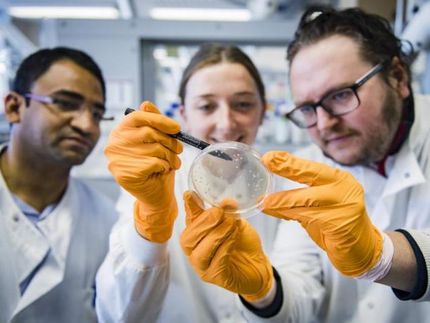Cheaper drugs, vaccines forecast as collaborations grow between developing countries' biotech firms
'South-South' biotech collaborations boost health, economies: Study
Advertisement
The availability of more affordable drugs, vaccines and diagnostics that would help countless people worldwide is the foremost benefit expected from a growing number of collaborations between biotech firms in developing countries, according to a study in the journal Nature biotechnology. Researchers from five developing countries, together with colleagues at Canada's McLaughlin-Rotman Centre for Global Health, interviewed over 300 experts in 13 developing countries to produce the first-ever large scale study of "south-south" collaboration in health-related biotechnology.
They found health biotech firms in Africa, Asia and Latin America are increasingly building trade and marketing links and pooling resources to address shared health problems in countries where a large proportion of the population can only afford low-priced health products. When these developing country firms fully leverage their respective strengths, they could deliver health products that reach far more poor people than products from firms in rich countries, according to the study. The international research team focused both on collaboration in research, typically carried out by universities and public research organisations, and collaboration in entrepreneurial activities, typically carried out by firms.
They say more than one quarter of health biotech firms in Brazil, China, Cuba, Egypt, India, and South Africa have built linkages with other developing countries as south-south collaborations start catching up to more traditional north-south partnerships.
Says project leader Halla Thorsteinsdóttir of the McLaughlin-Rotman Centre for Global Health, at the University Health Network and University of Toronto: "The key finding is that biotechnology firms in developing countries are becoming less dependent on relationships with similar firms in the industrialized north – they are able to help each other. We expect that, in future, we will increasingly see 'brother-sister' relationships between biotech firms in the developing world, and fewer 'parent-child' relationships with firms in developed countries."
"This first-ever survey of such relationships reveals that there are huge benefits to so-called 'south-south' collaboration, that the seeds of such collaboration can indeed deliver the fruit of better health to those in need."
For example, during Africa's 2007 meningitis outbreak, biotech firms in Brazil and Cuba used their respective strengths to provide African countries with affordable vaccines to prevent further spread of the disease.
"By working together, the two countries quickly developed a cost effective vaccine for Africa -- a clear example of how south-south collaboration is motivated by solidarity with each other and can actively improve global health," says co-author Dr. Tirso Sáenz of the Univeristy of Brasilia.
And, to combat persistent cholera outbreaks, firms in Bangladesh and India have teamed up to develop a new vaccine that, if successful, will be manufactured by the Indian firm Biological E (Hyderabad, India).
"India has strength in vaccine manufacturing and can do it cheaply. This is an advantage that other countries and international organisations should take advantage of," says co-author Dr. Sachin Chaturvedi of the New Delhi think tank Research and Information System for the Developing Countries.
Firms in Brazil, China, Cuba, Egypt, India and South Africa reported nearly 280 south-south collaborations. Brazil reported more than 60 such arrangements while mighty China - reflecting its massive domestic market - had fewer than little Cuba, a long time leader in innovative health strategies.
Surprisingly, governments and international organizations play a minimal role at this point, involved in less than 10 per cent of all south-south collaborations, the study reports.
Still, third party organisations can be important for south-south collaborations. The World Health Organisation, for instance, was crucial for the success of the Brazil-Cuba collaboration in providing meningitis vaccine for Africa, and the Academy of Sciences for the Developing World has been instrumental in building capacity through south-south collaboration in poorer African countries. In many ways such collaborations are a more relevant model of promoting innovation than the traditional model of relying on linkages with developed countries.
Says Dr. Wen Ke, a co-author from the Chinese Academy of Sciences: "Even large countries such as China need at times to look beyond their borders to access the necessary expertise."
South-south collaborations strengthen the capability of firms in southern countries to meet shared problems by pooling their expertise and resources -- to address issues rich countries in the north may not be affected by, nor interested in," says Dr. Victor Konde from the University of Zambia.
Earlier research shows Africa bears a quarter of the world's disease burden, yet accounts for less than one per cent of global expenditure on health. Sub-Saharan Africa imports nearly 90 per cent of its medicines. However this could rapidly change with 37 countries on the continent now engaged in some form of medicine production. Collaborations have enabled Egypt and Tunisia to meet the majority [60-95 per cent] of their own drug needs now.
"This locally-appropriate technology transfer between developing countries can bridge the divide between the health biotech haves and have nots," says Dr. Magdy Madkour at the Ain Shams University in Cairo. "When Egypt faced a shortage of insulin imported from developed countries, only China's door was open to overcome the insulin deficiency crisis."
Firms in developing countries are far from reaping the full benefits of south-south collaboration but cannot be expected to do everything on their own, according to the study.
Governments in the south need to better integrate south-south collaborations into their innovation policies and provide support to joint activities of firms from different developing countries. International organizations and philanthropic organizations engaged in promoting global health need to pay attention to the power of such south-south engagement in providing affordable health products.
"What is actually needed is a model of north-south-south collaboration, which harnesses the appropriate learning between developing countries and the technological and financial strengths of the North", says co-author Dr. Abdallah Daar of the MRC.
"There is considerable potential for firms in developing countries to be more cost effective than those in developed countries, providing health products that can reach more poor people in the developing world," he adds. "If successful, south-south collaboration increases capacity in science-intensive fields, improves the ability of developing countries to address their own problems, and contributes to economic development and quality of life in developing countries."
Although collaborations in science and technology have been high on the agendas of developing countries since the 1960s there has been little study of such collaborations and none at all into the health biotech sector until now.
Of the 288 health biotech firms that responded to the MRC survey, 27% reported south-south and south-north collaborations. South-north collaboration still dominates, with over half (53%) of the firms reporting collaborations with developed countries.
The study also determined that the vast majority (near 90 percent) of south-south collaborations relied on formal arrangements that ranged from supply agreements, to R&D cooperation and licensing agreements,to marketing and distribution agreements.
Cost and risk reduction are among the primary drivers of these partnerships but obtaining access to new markets is of paramount importance, firms reported, particularly for small countries like Cuba that are especially dependent on exporting their products to develop a more balanced economy. Collaborations also open the door to vital new research knowledge and technical skills.
"Everyone brings something to the table in successful collaborations: scientific expertise, technologies, skills, contacts and experience," says Dr. Thorsteinsdóttir. "For instance, many small firms taking their first steps in product development often need help navigating the regulatory environment."
Developing country biotech firms are increasingly aware of the importance of promoting development and innovation through joint efforts with one another, and have set up networks to deal with malaria, tuberculosis, HIV/AIDS and other common diseases. Brazil, China, Cuba, Nigeria, Russia, Thailand and Ukraine are working together in a network that jointly promotes research and development aimed at developing innovative diagnostics kits, drugs, and vaccines for HIV/AIDS prevention and treatment.
Concludes co-author Peter A. Singer, MD, Director of the MRC: "There are 5 billion brains in the developing world. When they connect, the light bulbs will really start to glow. And the more they work with each other, the less they will depend on the industrialized world."



























































